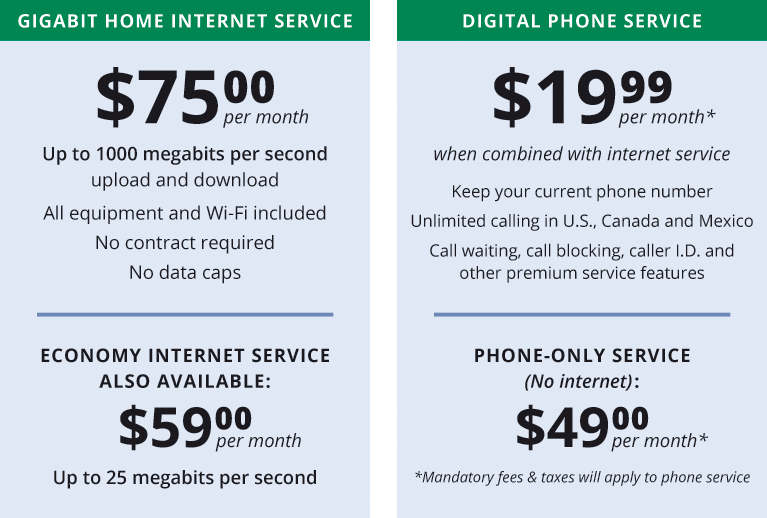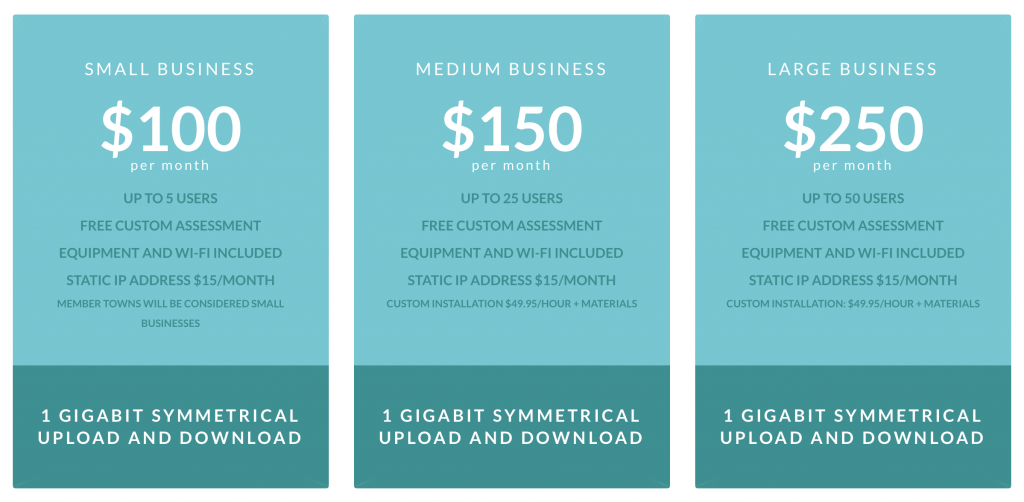

There is a one-time activation fee on all accounts.
Your town’s MLP may choose to add a monthly MLP fee to help defray depreciation reserve requirements and debt service for the money borrowed to build the network.
Getting Connected
When you sign up for service, your town’s MLP will bring a fiber connection from the network at the road to your house. The cost of this “drop” to your home will depend on how far you are from the road and whether you have overhead or underground utility service. The cost to you for this drop will depend on the available construction funds that your MLP has to work with.
Click on your town to sign up now:
Becket | Heath | New Salem | Rowe | Washington | Windsor
Questions? See the FAQ page for your town:
Becket | Heath | New Salem | Rowe | Washington | Windsor
Working Together
The towns of Becket, New Salem, Rowe, Washington and Windsor are charter member of WiredWest, a municipal co-op formed to bring broadband to towns in Western Massachusetts. WiredWest will be your towns Internet Service Provider and has contracted with Whip City Fiber to operate the network and serve our customers.
Why are the towns of Becket, New Salem, Rowe, Washington, and Windsor working with WiredWest?
By serving its member towns on a regional basis, WiredWest will reduce the administrative burden, cost and risks of owning and operating a fiber network. Customers will pay WiredWest for services, and as a non-profit cooperative, it will return excess revenues to its member towns.
What does Whip City Fiber do? Whip City Fiber is an internet service provider owned and operated by Westfield Gas + Electric. It has a successful track record serving customers in the city of Westfield and is working with several towns in Western Massachusetts to launch broadband service over municipal fiber networks. As a subcontractor to WiredWest, Whip City Fiber will operate and maintain our network and deliver service to our customers.

Wiredwest Releases Analysis Showing Significant Cost Advantage Of A Regional Fiber Network Over Stand-Alone Town Networks
Read the Report
It recently became clear that a rational, data driven analysis comparing the financial impacts of regionalization with towns going it alone was needed for all involved. Only with such a comparison could towns make informed, eyes wide open, decisions on how best to proceed with bringing broadband to their citizens. And this data will assist our elected and appointed leaders in their effort to weigh the pros and cons of the range of solutions to bridge our digital divide. This analysis is now complete and provides an in-depth financial comparison of a regional broadband network model to a standalone model. It includes an online app and can be applied to any of our towns. The report is now available by clicking here.
This data-driven analysis uses as a standard the Leverett, MA model – whose currently operating ISP & Network services are fully outsourced. Known capital costs from Leverett’s project and town operational cost estimates from the MBI are utilized. These provide the basis for comparing building and operating fiber-optic networks in individual western Massachusetts towns vs. towns jointly building and operating a fiber-optic network through a regional cooperative.
The results of the analysis are exceptionally compelling and show two important things — first, that monthly fees for subscribers in towns belonging to a regional network will be far lower than if they resided in towns operating stand-alone networks. And second, the analysis shows that smaller, less affluent towns can still afford to build long-term fiber broadband infrastructure instead of low bandwidth, wireless stopgaps.
We highly recommend sharing the Regionalization Analysis with your town officials. A press release with […]
Small towns join forces to bridge the digital divide

Tim Newman (WiredWest Spokesperson and Delegate from New Marlborough) and Bob Labrie (WiredWest Executive Committee, Treasurer and Delegate from Goshen) are interviewed for this piece that showcases the efforts small towns are making to bring high speed internet to rural America.
Click here for a link to the story and accompanying transcript.
While cable companies provide internet services for the majority of Americans in urban areas, many rural residents have been left on the dark side of the digital divide. According to a report by the Federal Communications Commission, 34 million Americans lack access to high speed Internet — 23 million of them in small towns and rural areas of the country. Now, some communities are banding together through internet cooperatives to build their own high speed networks. NewsHour Weekend Correspondent Ivette Feliciano reports.
The Hills Are Dead — Without the Sound of Internet Access: Susan Crawford Blog Post
 Susan Crawford is one of the three authors of the WiredWest Case Study. What Elizabeth Warren is to the Financial Services Sector, Susan Crawford is to Telecommunications Industry and the Internet. In this personal blog she expresses her dismay over the Commonwealth’s handling of the now-stalled effort to bring modern internet infrastructure to rural Western Mass (and indirectly to rural communities all over America).
Susan Crawford is one of the three authors of the WiredWest Case Study. What Elizabeth Warren is to the Financial Services Sector, Susan Crawford is to Telecommunications Industry and the Internet. In this personal blog she expresses her dismay over the Commonwealth’s handling of the now-stalled effort to bring modern internet infrastructure to rural Western Mass (and indirectly to rural communities all over America).
The Hills Are Dead — Without the Sound of Internet Access sheds light on the national failure to provide high-speed digital access to rural America. link to her blog
Gov. Baker, connect us now and release the funding to build our network!
Sign the Petition Now!
Our towns are withering. Without broadband, the future of small Western Massachusetts towns is bleak…
We’ve been living on wrong side of the digital divide for years, not able to fully participate in 21st century life and falling further behind year by year. But as last summer came into bloom, it looked like everything was about to change. True broadband—fiber to the home—seemed within our grasp.
Many of us were part of that moment, participants in historical town meetings with attendance busting standing-room-only votes to bring broadband to our communities. 24 WiredWest towns passed their funding authorizations in April, May and early June, approving $38 million to bring broadband to their towns. The mood was near euphoric. The 7 remaining WiredWest towns eligible for funding were looking forward to their town votes to join the regional project. Broadband was in our future. Finally! Detailed engineering planning and pre-construction surveys were projected to begin in a matter of months!
“Then,” said nationally recognized telecommunications policy expert, Susan Crawford, “the wheels fell off the bus.” And now, a year later, there has been no progress and all funding is currently frozen. The government agency the MBI, in charge overseeing the statewide initiative, providing 1/3 of the funding, and managing network build, has accomplished absolutly nothing.
What the hell happened?
Hundreds of town employees and volunteers across and were among them!—donated their time and expertise in engineering, financial, legal, technology and marketing fields to produce viable broadband solutions for their communities. WiredWest […]


